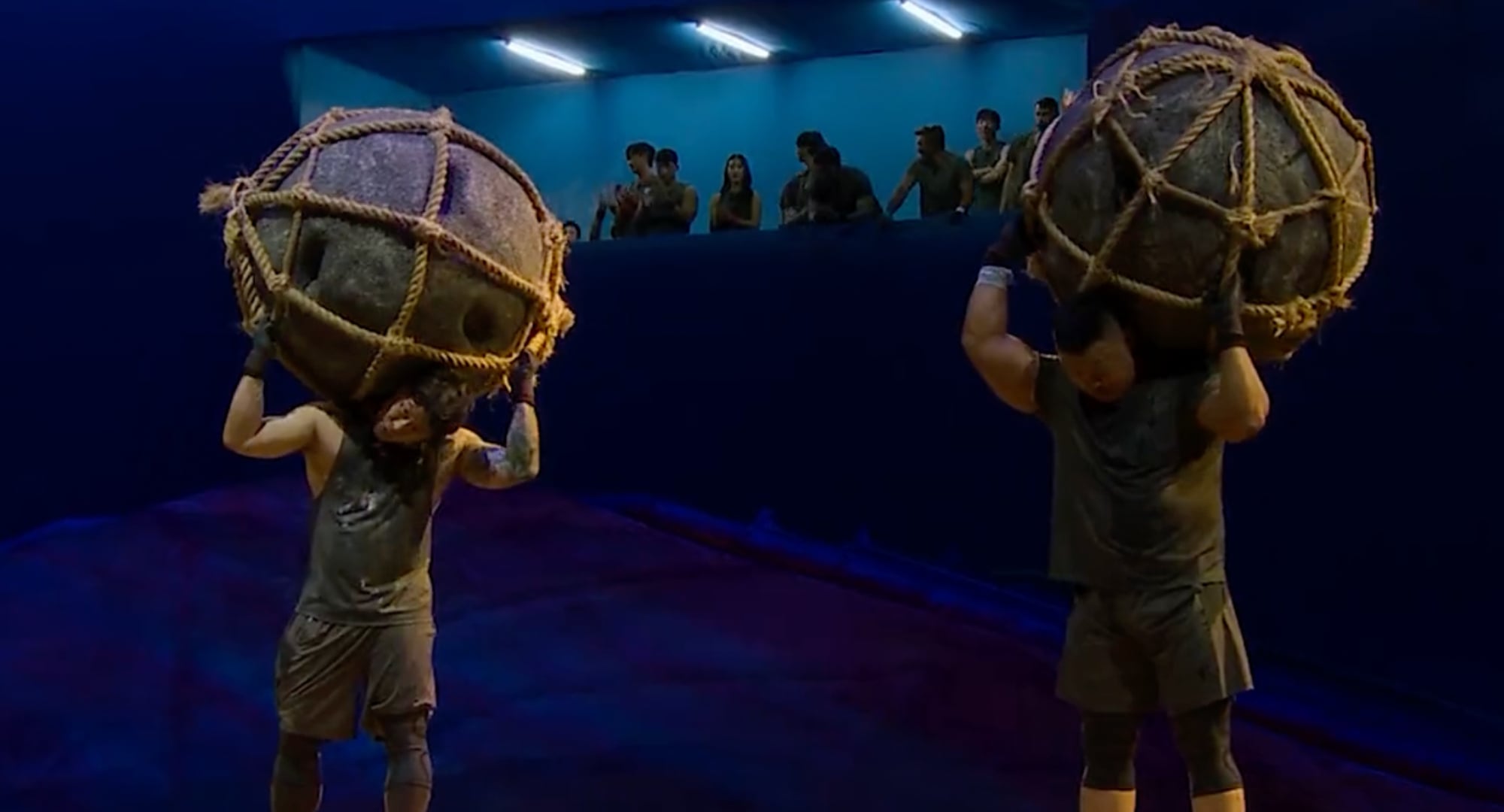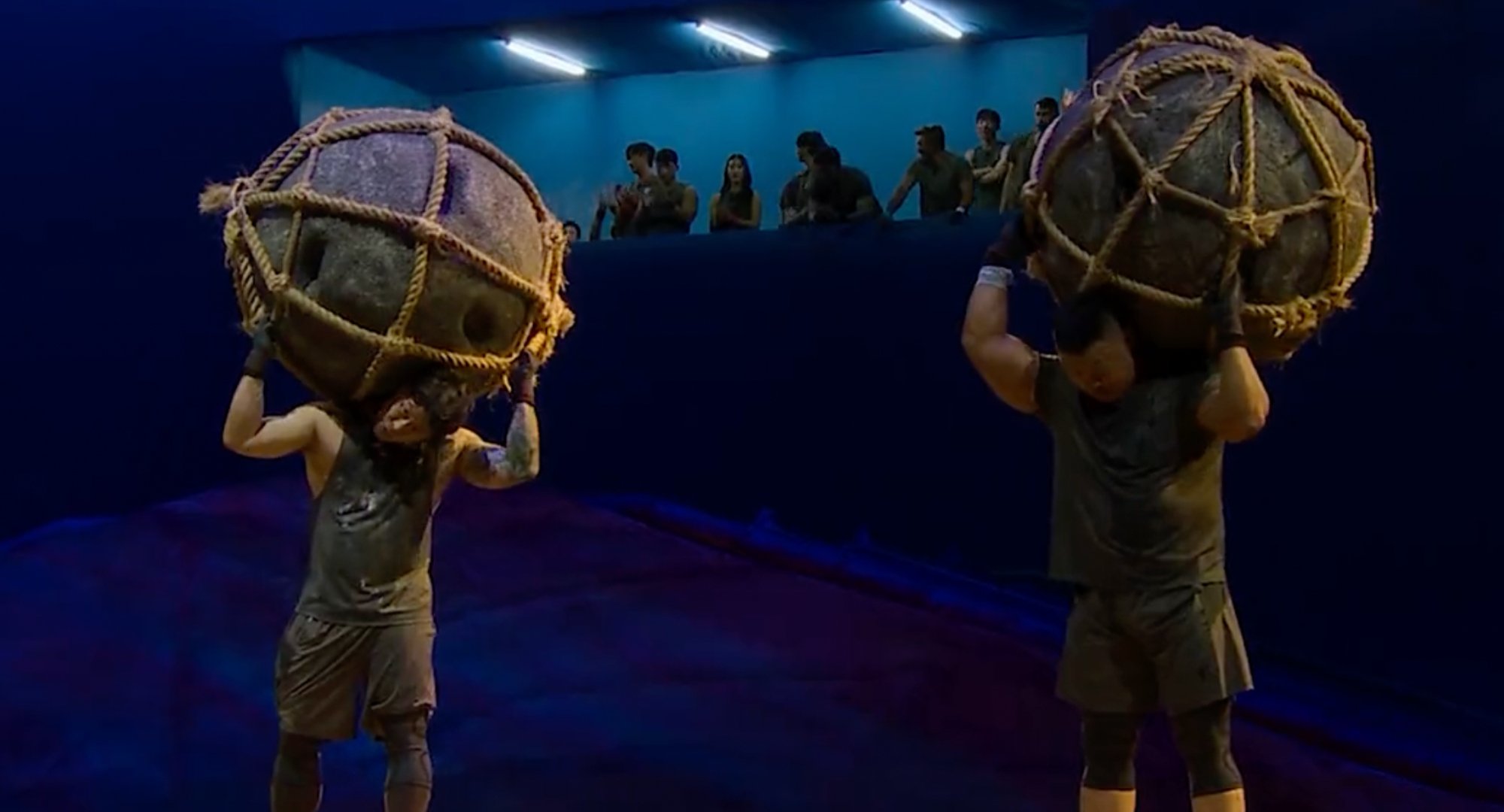
‘Physical 100’: A Breakdown of the Greek Mythology Stories Used in the Pre-Finale
Its ruthless battles among the strongest athletes to see who will be crowned the best in Netflix‘s Physical 100. The Korean unscripted series might as well be compared to battles between warriors in ancient times. The contestants have fallen one by one in unique quests, from pulling a ship to feats of strength and teamwork. But before the Physical 100 finale, the contestants took part in a fourth quest of five games inspired by well-recognized Greek mythology.

‘The Punishment of Atlas’ has the contestants hold the weight of the world
For the fourth quest, the winning teams must delegate one contestant for each of the five games. The first is The Punishment of Atlas has the contestants hoist a large rock over their shoulders. They must withstand the weight for as long as possible until there is only one winner. Based on ancient mythology, Atlas is a well-known figure in Greek stories.
According to Greekmythology.com, Atlas was the son of Iapetus and the Oceanid Asia, or some believe it was Clymene. Many know him as being of the most recognized Titans who led the rebellion against the Greek God, Zeus. He was unsuccessful, and as punishment, he was condemned to hold the weight of the sky for eternity. Likely using Medusa’s head, Perseus turned him into stone and became Atlas Mountains.
‘Physical 100’ used the story of Prometheus for its Greek mythology quest
The second game based on Greek mythology on Physical 100 was The Fire of Prometheus. For the challenge, four contestants must run through an obstacle course to capture a torch. Each round eliminates one player until one remains the winner. Non-Korean Physical 100 contestants Miracle and Dustin Nippert fought in the challenge. Prometheus’s story inspired the fire aspect of the game during the rebellion against Zeus.
He was the son of the Titan Iapetus and the Oceanid Clymene. In the rebellion, he and his brother Epimetheus aided Zeus to victory. But Prometheus argued with the great god over how humanity was being mistreated. In retaliation, he stole fire and gave it to humans.
To answer for his betrayal, Zeus chained Prometheus and had an eagle eat at his regenerating liver. In the end, Hercules freed him of his endless torture and reconciled with Zeus.
‘The Wings of Icarus’ is a Greek mythology story about a father and son
On Physical 100, the fourth quest adds an interesting interpretation of the Greek mythology story about Icarus. The Wings of Icarus game has four contestants climb a rope. But the goal is not to reach the top. As the contestants climb, the rope lengthens. The contestant still holding on by the end is the winner. But how does it tie to Icarus?
According to Greekmythology.com, Icarus’s story is a perfect example of not heading to the warning. He was the son of master crafstmen Daedalus. His father was well-known as a sculptor and architect. He worked on the palace of King Minos of Crete. Daedalus was commissioned to build a labyrinth to house the minotaur son of Mino’s wife. But Theseus killed the minotaur with a claw given to him by Daedalus.
Minos confined Daedalus and Icarus to a tower above his palace. Wanting freedom, Daedalus fashioned two pairs of wings. He warned his son not to fly close to the sun of the wax holdings the feather would melt. Icarus ignored the warning and plummeted into the ocean to his death.
‘Physical 100’ uses the Greek mythology story of Sisyphus
One of the most challenging games of the fourth quest is The Punishment of Sisyphus. Four contestants must roll a heavy boulder up and over a hill before time runs out. If one contestant does not get over the hill, they lose. The game had Jong Hae-min, bodybuilder Ma Sun-ho, Physical 100’s Yun Sung-bin, and Choo Sung-hoon fighting to win.
According to Greekmythology.com, Sisyphus’s story is one of evil. He was the son of King Aeolus of Thessaly and Enarete and would later become king of Ephyra (Corinth). But Sisyphus’s constant breaking of the rules caught the eye of Zeus. He first violated Xenia, which shows hospitality to travelers and guests. Instead, Sisyphus killed many to show his ruthless power.
He then betrayed Zeus by telling the river god Asopus the whereabouts of his daughter, who Zeus had kidnapped. Zeus tasked Thanatos, the personification of death, to chain Sisyphus in the Underworld. In a trick, Sisyphus instead chained Thanatos, stopping the cycle of death. An angered Ares, the God of War, freed Thanatos and chained Sisyphus.
As a punishment, Zeus damned Sisyphus to carry a boulder over the hill for all eternity. But once the boulder reached the top, it would roll down.
‘The Tail of Ouroboros’ has the contestants chase after each other
The fifth quest’s final game has four contestants running on a track behind one another. With endurance and speed, the contestants must tag each other out until one remains. The ancient mythology story of Ouroboros inspired the Physical 100 game. Fans saw the card in the series depict a snake eating its own tail.
Ouroboros is not necessarily a person but a symbol seen throughout history. While appearing in Greek mythology, BBC explains, “The oldest-known ouroboros appeared on a golden shrine in the tomb of Tutankhamen – ‘King Tut’ – in Egypt in the 13th Century BC.” In Egypt, it represented the “repetition, renewal, and the eternal cycle of time” and connected to “the flooding of the Nile and the journey of the sun.”
In Greek mythology, Ouroboros had a different yet similar connotation. It instead symbolized “eternity and endless return.” The infamous symbol appears in multiple histories from Gnostics and Norse mythology.


